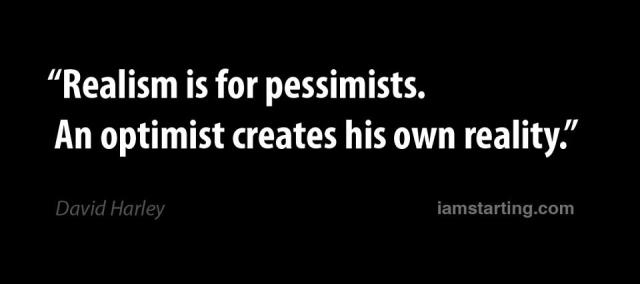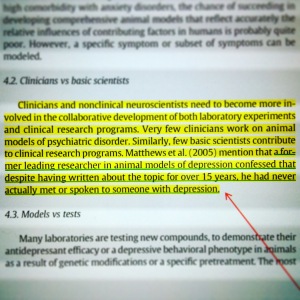The last time I seriously considered dropping out of college (one of many, many times over this past year) was around January 16th. I was in danger of not completing my fall semester coursework despite being given an extra five weeks. The problem was not that I lacked the knowledge necessary to accomplish the work, but that I lacked the motivation to start work and to continue working. So with my neuroscience research grant proposal due in under two weeks, my mom and sister managed to find me a tutor who based on some initial email correspondence seemed to them not just extremely well-qualified (an MD-PhD candidate at UCLA who had worked in a neurobiology lab for some years in New York; Rhodes scholar nominee… The list goes on I was told) but also compassionate and understanding of the issue of depression (I later learned that he suffers from bipolar disorder).
With only ten days left before my grant proposal was due, we got started. Despite a productive first session, though, I tried to cancel the second meeting. I felt like I still wasn’t going to get anywhere given that I still had no motivation to work on my assignment on my own. I called up my tutor saying that I had to cancel, as I was going to drop out of college. When he asked why, I tearily explained that a college education these days is overvalued by society, not to mention that the pay-off is pathetic–it can be extremely expensive, and student debt can be staggering. I said that I could instead write a book telling my experience with depression while arguing this point that college degrees are overvalued, and thereby circumvent the potential problem of unemployment due to the lack of a college degree. And as any normal person is supposed to do in response to my sentiment, my tutor told me that I should just come to the session and that things would get better. I ended up going for the sole reason that if I hadn’t, my tiger mom would have been pissed. So even if I failed my courses, no one could say it was because I refused to comply. I told him that that was my reason for going, and he was fine with that.
We met in a Coffee Bean and first spent thirty minutes discussing my depression, the option of suicide, the fact that he had friends who had committed suicide, his belief that it’s a waste of great potential when someone commits suicide, my opinion that really one should feel good for the person who commits suicide because he/she is no longer suffering. I explained the plans for my book in some more detail, telling him that I was going to expose and critique the weaknesses of America’s mental health care, mentioning that there are tons of well-meaning quacks out there and that I don’t trust any psychotherapist who doesn’t have a PhD.
“I don’t either,” he said, locking onto that. “That PhD counts for something. You use that as a way to distinguish between qualified and unqualified people. And what about your book? People will be more interested in reading a book by a Wellesley College graduate than a high school graduate.”
“That’s a good point,” I had to admit. If I’m going to write a book, I want to be perceived as having some credibility. I knew that if I were someone picking up my book, I would take it less seriously if it were written by a drop-out. A college drop-out trying to argue that college is overrated… Where’s the surprise in that? The idea brings up the image of a bitter, unsuccessful person who instead of admitting that she should have completed her degree, wants to place the bulk of the blame on institutions. Although the image is false, its effect would be contrary to the goal of destigmatizing mental illness, which is a fundamental part of my writing the book in the first place.
I felt satisfaction, relief, and assurance. I do love it when someone is able to provide a strong rebuttal to my anxiety-provoking ideas. The idea of dropping out of college is perhaps just as terrifying to me as staying. It is a big, wide unknown. For all I know, quitting could just make depression an even stronger presence in my life. (By the way, I want to note that being able to effectively counter my arguments is something I require of and have trouble finding in a therapist. Essentially, the therapist must be intelligent and appreciating of logic and cohesion. I need to be shown why my thinking is wrong and provided with a feasible alternative. Granted, only one of the four or five therapists I’ve had in the past has a PhD; the rest were a couple MFTs, an LCSW, and an intern. However frustrating therapy has so far been, I’m glad that I have at least learned something about what to avoid in a therapist and can from here on narrow down my searches.) After those first 30 minutes, we were able to move on to the assignment and I made some good progress. We accepted that I was most productive during the sessions than on my own, so we arranged to meet for two hours a day for the rest of the week before my flight to Boston. My tutor basically acted as the prefrontal lobe of my brain, taking on the executive functions that my depression had barred my access to. Those functions included things like getting started (It was ok if I hadn’t gotten anything done since we last met, as long as I showed up for the next session; this made everything way less stressful and daunting for me), managing time, remembering what I was supposed to attend to next, and doing things step by step. Frequently I was overwhelmed thinking about how much more had to be done to complete the proposal; at these times my tutor would take me through the baby steps by having me focus on the specific questions that I needed to address and helping me come up with new ones.
At the end of the week my mom was left with a hefty bill to pay, and she’s probably still paying it off, but she’s a tiger mom as I said and it was all worth it to her. It was worth it to me, too. At least, I feel less anxious now. I finished the proposal for that course and took my final exam for the other, got passing grades for both, and am now focused on this last semester. As of now I don’t think that getting a degree in the end will have been worth the seven years of hell I have experienced since starting here in September 2009. But given that I can’t change the past, and provided that I keep living, a degree is better than no degree.












